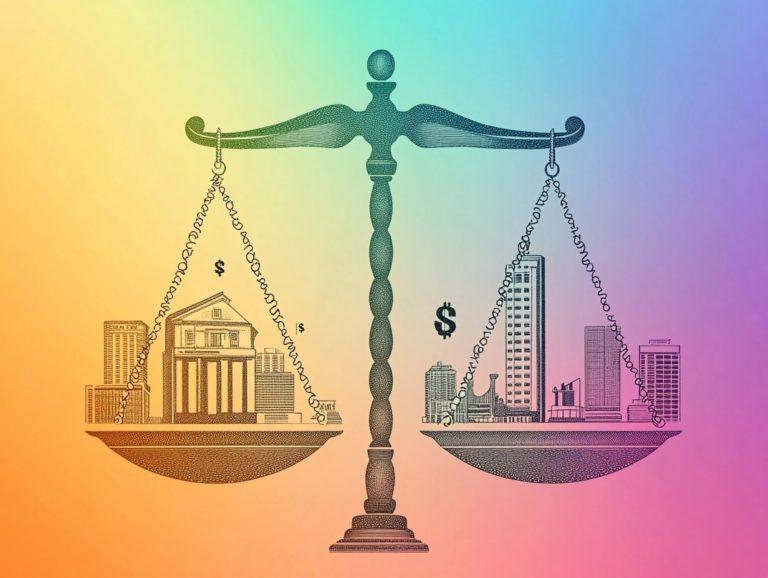The Future of Sustainable Investment Strategies
Sustainable investing transcends mere trend; it signifies a transformative shift in your approach to finance.
As your awareness of environmental and social responsibilities deepens, you’ll find yourself seeking strategies that harmonize your financial ambitions with a positive impact on the world.
Get ready to explore the exciting world of sustainable investing! This article illuminates its importance not only for society but also for financial performance. It examines various investment strategies and the accompanying challenges and opportunities that await.
Discover how to incorporate sustainable principles into your investment decisions and gain valuable insights into the future of this dynamic field. Whether you re a seasoned investor or just embarking on your journey, grasping the nuances of sustainable investing is crucial for navigating today s complex financial landscape.
Contents
- Key Takeaways:
- Defining Sustainable Investing
- The Importance of Sustainable Investing
- Types of Sustainable Investment Strategies
- Challenges and Opportunities in Sustainable Investing
- Implementing Sustainable Investment Strategies
- The Future of Sustainable Investing
- Frequently Asked Questions
- What is the future of sustainable investment strategies?
- Why is sustainable investing becoming more popular?
- How do sustainable investment strategies benefit companies?
- Are there any challenges to implementing sustainable investment strategies?
- What role do governments play in the future of sustainable investment strategies?
- How can individual investors get involved in sustainable investing?
Key Takeaways:

- Sustainable investing is a growing trend that considers both financial performance and environmental and social impact.
- There are various types of sustainable investment strategies, such as socially responsible investing, impact investing, and green investing.
- Despite challenges, the future of sustainable investing looks promising with potential for growth, innovation, and incorporation into investment decisions.
Defining Sustainable Investing
Sustainable investing is all about weaving environmental, social, and governance (ESG) factors into your investment decisions. You re not just chasing financial returns; you’re striving for a positive impact on the planet and society.
This approach resonates deeply with investors like you, especially millennials, who increasingly seek transparency and accountability in their portfolios.
By concentrating on renewable energy, robust corporate governance, and sustainable products, sustainable investing tackles urgent global challenges like climate change while presenting promising investment opportunities.
The Importance of Sustainable Investing
The significance of sustainable investing is paramount, as it directly addresses pressing global challenges such as climate change. This approach offers you pathways to achieve both financial performance and a positive environmental impact.
By including ESG information in your investment portfolio, you not only advance climate action but also champion companies that prioritize social responsibility and sustainable practices.
This strategic approach allows you to align your financial goals with your values, making a meaningful difference in the world.
Environmental and Social Impact
Sustainable investing can greatly impact both the environment and society. It prioritizes initiatives that reduce carbon footprints and promote social responsibility.
Take Bloomberg, for instance; they lead the way in highlighting sustainable investment opportunities. This helps you easily identify projects focused on clean energy, such as wind and solar farms. These initiatives not only lessen our reliance on fossil fuels but also create jobs and invigorate local economies.
When funds back companies with ethical labor practices, they inspire a ripple effect of social responsibility, encouraging others to follow suit. Consider the successful implementation of community solar projects, which demonstrates how collective investment can empower neighborhoods.
Meanwhile, initiatives in sustainable agriculture significantly reduce resource usage and promote better food equity. By concentrating on these impactful trends, sustainable investing serves as a vital force in fostering a healthier planet and a more equitable society.
Join the movement toward sustainable investing today and help shape a better future!
Financial Performance
Financial performance in sustainable investing is increasingly recognized as a viable metric. Studies reveal that companies adhering to Environmental, Social, and Governance (ESG) practices often surpass their peers financially. This includes navigating confusing situations like greenwashing, where companies may falsely tout their sustainability efforts.
It s crucial to engage in thorough ESG data analysis to construct a robust investment portfolio. Numerous studies have established a strong correlation between solid environmental, social, and governance practices and long-term profitability. For instance, research from Harvard Business School shows that firms with high sustainability ratings enjoy lower capital costs and consistently outperform the market.
This trend reflects a growing investor recognition of the significance of ethical practices. As an investor, you must remain vigilant against greenwashing. Some corporations may inflate their sustainability claims without genuine commitment. This underscores the necessity to rigorously evaluate how companies are run, ensuring that your investments truly align with sustainable principles.
Doing so can lead to ethical outcomes and significant financial gains.
Types of Sustainable Investment Strategies

You have a range of sustainable investment strategies at your disposal, each providing distinct pathways to align your financial objectives with your personal values.
- Socially Responsible Investing (SRI)
- Impact Investing
- Green Investing
These options allow you to select how you engage with ESG principles. This gives you the power to make informed decisions that resonate with your commitment to sustainability and responsible corporate governance, ensuring that your investments reflect what truly matters to you.
Socially Responsible Investing
Socially Responsible Investing (SRI) is your opportunity to align your investment choices with your ethical values, focusing on companies that meet specific ESG criteria. This strategy gives you the power to actively support businesses that prioritize sustainability while steering clear of those associated with harmful practices.
By integrating environmental, social, and governance factors into your decision-making processes, you can pursue financial returns while championing positive societal change. Unlike traditional investing, which typically focuses solely on profits, SRI offers a broader perspective that considers the societal impact of your investments.
This shift underscores the importance of funding enterprises that contribute to environmental conservation and social equity, reinforcing the idea that financial growth and ethical responsibility can indeed coexist harmoniously.
As awareness of climate change and social injustices grows, your interest in portfolios that reflect sustainable values becomes increasingly relevant, making SRI a crucial element of modern financial strategies.
Impact Investing
Impact Investing represents a transformative approach that allows you to generate measurable social and environmental benefits alongside financial returns. It s an appealing option if you re an individual investor looking to make a meaningful difference.
By targeting pressing challenges such as climate change and healthcare access, Impact Investing opens up valuable opportunities that resonate with your values. This strategy not only emphasizes profit but also prioritizes societal impact, distinguishing it from traditional investing, which often focuses on financial gain alone.
For instance, consider successful initiatives that support renewable energy in developing nations. These projects yield financial returns while making a significant dent in carbon emissions.
Opportunities in affordable housing developments also reflect strong alignment with social objectives, enhancing community well-being while ensuring a profitable return on your investment. Ultimately, Impact Investing gives you the power to contribute meaningfully to pressing global issues while securing your financial future.
Start investing in sustainable strategies today to secure a better future!
Green Investing
Green Investing focuses on putting your money into renewable energy projects and sustainable companies, allowing you to align your financial goals with meaningful climate action. This strategy has gained significant momentum as many global investors recognize the urgency of tackling climate change while pursuing profitable opportunities.
By adopting this investment philosophy, you are not only supporting the development of green technologies (technologies that help the environment) and infrastructure such as solar panels, wind turbines, and electric vehicles but also playing a crucial role in fostering a more sustainable future.
The companies leading the charge in these innovations, like Tesla in electric transportation and NextEra Energy in wind and solar projects, are rapidly changing the game, exemplifying how financial returns can harmoniously coexist with environmental stewardship.
As these initiatives flourish, they generate substantial economic growth while contributing to a reduction in carbon footprints, highlighting the dual benefits of Green Investing. Many individuals and organizations are attracted to the potential of such strategies, signaling a significant shift toward environmentally-conscious investment practices.
Challenges and Opportunities in Sustainable Investing
Sustainable investing opens up exciting opportunities for you to align your portfolio with your values, but it s not without its challenges. You may encounter concerns about greenwashing and the necessity for thorough Environmental, Social, and Governance (ESG) data analysis.
By navigating these complexities, you can uncover innovative investment strategies that not only deliver financial returns but also significantly advance global sustainability efforts.
Obstacles to Adoption

Obstacles to adopting sustainable investing often include misconceptions about financial performance and the ongoing challenge of greenwashing, which can erode your confidence as an investor. Access to accurate ESG data is crucial. It empowers you to make informed decisions.
The investment landscape is frequently clouded by misinformation, leaving many potential investors unaware of the long-term benefits that environmentally and socially responsible investments can provide. The absence of standardized metrics complicates the evaluation of companies’ sustainability efforts.
To navigate these challenges, promoting transparency and educating yourself on reliable sources of information, such as industry reports and certifications, is vital.
Fostering collaborations between financial institutions and independent ESG data providers can ensure that the information at your disposal is comprehensive and trustworthy, ultimately leading you to make more robust investment decisions.
Potential for Growth and Innovation
The potential for growth and innovation in sustainable investing is truly remarkable, especially as you, the individual investor, increasingly seek to align your portfolio with societal needs and values. Investment opportunities in sectors like renewable energy, healthcare, and sustainable products are surging, driven by a rising demand for responsible corporate governance.
This shift toward sustainable finance isn’t just a passing trend; it is evolving into a vital framework for global investors like you, who are in pursuit of long-term returns. Emerging sectors such as clean technology and sustainable agriculture offer unique opportunities that balance profitability with environmental stewardship.
As regulations tighten and consumers become more discerning, the focus on transparency and ethical practices enhances the significance of sustainable investing. This progressive mindset indicates a paradigm shift, encouraging innovative practices that promise not only solid financial gains but also meaningful contributions to societal development.
Implementing Sustainable Investment Strategies
Implementing sustainable investment strategies demands a thoughtful approach that weaves ESG practices into your investment portfolio, ensuring harmony between your financial objectives and personal values.
By exploring the range of sustainable investment products available and grasping their implications, you can make informed decisions that not only enhance your portfolio but also contribute to a more sustainable future.
Steps to Incorporate Sustainability into Investment Decisions
Incorporating sustainability into your investment decisions involves several key steps, including looking at environmental, social, and governance (ESG) data and understanding the corporate governance structures of potential investments. This comprehensive approach ensures you can effectively align your choices with your values and long-term objectives.
To start, actively seek out companies that disclose their sustainability practices, particularly those adhering to the Global Reporting Initiative (GRI) – a framework for sustainability reporting. Assessing the ESG ratings from various agencies will help you identify organizations that prioritize environmental stewardship, social responsibility, and sound governance. Engaging with management during shareholder meetings can also offer valuable insights into their commitment to ethical practices.
Many investors are shifting their portfolios toward renewable energy companies, reinforcing the idea that sustainable investments not only deliver positive ethical outcomes but can also yield substantial financial returns over time.
The Future of Sustainable Investing
The future of sustainable investing is incredibly promising, particularly as millennial investors increasingly prioritize social responsibility and environmental stewardship. You ll find that the demand for sustainable finance and responsible investment strategies is set to grow, as more individuals, like yourself, come to appreciate the significance of aligning their investments with their core values.
This shift not only reflects a changing mindset but also signals an exciting opportunity for you to make a meaningful impact with your financial choices.
Trends and Predictions

Current trends in sustainable investing reveal a notable shift towards incorporating ESG practices into traditional investment frameworks. You can anticipate that individual investors will increasingly seek out opportunities that generate positive societal and environmental impacts, in addition to financial returns.
This movement represents a lasting change in how we view investments. As institutional investors start to embrace this new paradigm, you can expect a wave of innovative financial products that align with ESG criteria.
Thanks to advancements in technology, analyzing and reporting on sustainability factors has become more accessible, further igniting investor interest. Stakeholders will likely demand more transparency, which will push companies to adopt sustainable practices, creating a cycle where responsible investing transforms into the standard rather than the exception.
Frequently Asked Questions
What is the future of sustainable investment strategies?
Discover why sustainable investing is more important than ever! The future of sustainable investment strategies is moving towards incorporating environmental, social, and governance (ESG) factors into investment decision-making. This means considering not just financial returns but also the impact on the planet and society.
Why is sustainable investing becoming more popular?
Sustainable investing is becoming more popular because of increasing awareness and demand for responsible and ethical investments. People are realizing the impact their investments can have on the environment and society and are seeking to align their values with their investments.
How do sustainable investment strategies benefit companies?
Sustainable investment strategies can benefit companies by improving their ESG performance, reducing risk, and attracting socially responsible investors. They can also lead to long-term success by promoting sustainable business practices.
Are there any challenges to implementing sustainable investment strategies?
Yes, there are challenges to implementing sustainable investment strategies, such as the lack of standardized ESG data, limited transparency from companies, and the potential for greenwashing. However, these challenges can be overcome with proper research and due diligence.
What role do governments play in the future of sustainable investment strategies?
Governments are key players in the future of sustainable investments. They set rules that encourage eco-friendly practices.
By offering incentives, they motivate companies to enhance their environmental, social, and governance (ESG) performance. They also ensure these companies are accountable for their social and environmental impact.
How can individual investors get involved in sustainable investing?
You can dive into sustainable investing right now! Start by researching investments that reflect your values and positively impact the world.
Consider joining sustainable investment funds or finding financial advisors who specialize in this area.






